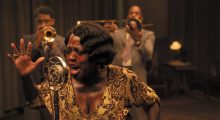Authors — Martin Johnson
-
“… Once a Person’s Voice is Captured, They are Expendable”: Director George C. Wolfe on the Musical Histories of Ma Rainey’s Black Bottom

Black music. White privilege. Chicago. 1927. What could possibly go wrong? Indeed, nearly everything, and it’s chronicled with artful intensity in August Wilson’s Ma Rainey’s Black Bottom, the second in a cycle of ten plays that compassionately detail the 20th-century experiences of African Americans. Ma Rainey’s was brought to the screen this season in a stellar production directed by George Wolfe that stars Viola Davis in the title role and, in his final role, Chadwick Boseman as the upstart young trumpeter and rake in her band. Wolfe, a Tony Award-winning theater director and writer, is gradually building a formidable resume […]
by Martin Johnson on Feb 23, 2021 -
On the Beat

Chicago in 1927 was a fascinating, volatile place. The Great Migration, which saw an estimated six million African Americans leave the rural southern states for the urban north, was in full effect, and the Windy City was an important destination. By the mid 1920s, an estimated 100,000 Black people had settled in Chicago, making the city a hotbed for new cultural developments, especially in music—Chicago is widely regarded as the second stop in the evolution of jazz after New Orleans. The August Wilson play Ma Rainey’s Black Bottom tells one chapter of that evolution through a dramatic imagining of a single recording session […]
by Martin Johnson on Feb 10, 2021 -
“Love and Injustice”: Composer Nicholas Britell on the Score for Barry Jenkins’ If Beale Street Could Talk

New York City in the 1970s occupies a special place in the popular imagination; there was a look and feel and, more important, a sound that captured the range of the city from grit to glitz. Barry Jenkins’s new If Beale Street Could Talk is set during this era of New York City, and the look is unmistakable: The backdrop is full of Impala yellow taxis, small shops and cool lofts. Yet the city fades into the background, giving way to the compelling and un-self-consciously presented love story of Tish and Fonny, childhood best friends in Harlem who become lovers […]
by Martin Johnson on Dec 20, 2018



